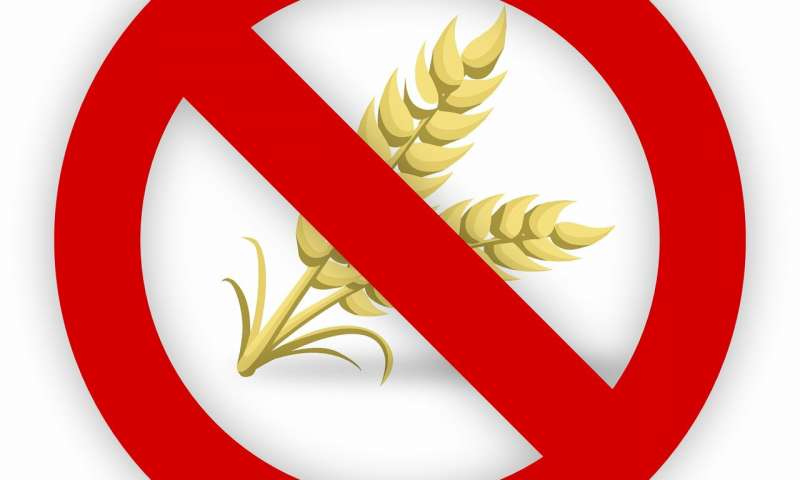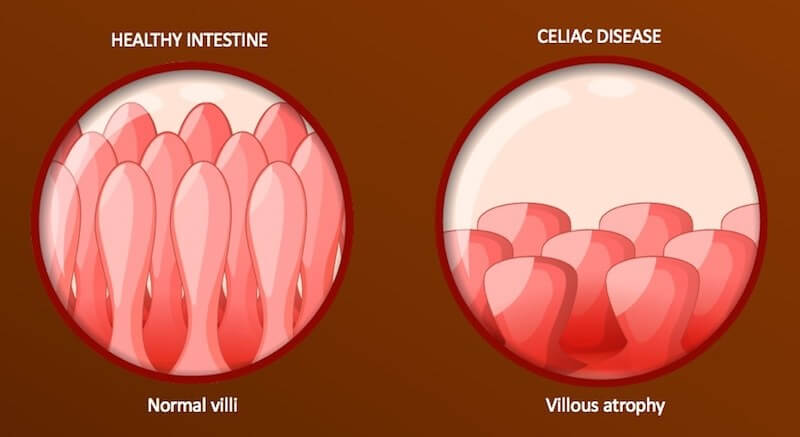- If you suffer from celiac disease, consuming gluten will damage your small intestine and prevent your body from absorbing the necessary nutrients from the food you eat.
- Unfortunately, there is no medication that can help you treat celiac disease. The only possible solution is to bar gluten out of your diet.
- Asking a nutritionist for advice is the best decision you can make. A specialist will provide you with valuable information on how to start your gluten-free diet.
- An annual check-up with your physician will allow you to keep under control nutrient deficiencies and assess symptoms and progress.
Is there a celiac disease treatment? Currently, there is no treatment or medicine you can take to cure celiac. People who suffer from the autoimmune disease need to think in terms of management.
This means they can manage the disease and lower the symptoms sometimes down to zero and live a healthy life as long as they always keep a strict diet of gluten free food.
An autoimmune disorder that affects 1 in 100 people worldwide, celiac disease is a serious health condition that must not be treated lightly as it may cause long-term health complications such as an increased risk of developing coronary artery diseases, intestinal cancers, anemia, migraines, infertility, serious vitamin and mineral deficiencies, osteoporosis, etc.
What is celiac disease?
In simple terms, if you suffer from celiac disease, consuming gluten will damage your small intestine and prevent your body from absorbing the necessary nutrients from the food you eat.
Your body’s immune response to gluten gives birth to toxins that cause severe damage to the villi. Located in the small intestine, villi are tiny finger-like protrusions that allow your body to absorb nutrients.
If they get damaged, your body will no longer be able to absorb the nutrients from the food you eat, leading to malnutrition, intestinal damage that can be permanent, and many other long-term conditions.
Celiac disease treatment
Unfortunately, there is no medication that can help you treat celiac disease. The only possible solution is to bar gluten out of your diet. A strict gluten-free diet will allow your small intestine to heal, prevent inflammation, and foster proper nutrients absorption.
However, maintaining a gluten-free diet may be a complicated task, especially if your condition has been newly diagnosed. Asking a nutritionist for advice is the best decision you can make.

A specialist will provide you with valuable information on how to start your gluten-free diet and help you:
- Learn how to check labels and food for gluten and detect hidden sources of gluten (e.g. cross-contamination)
- Design an efficient meal plan and make healthy choices
- Keep an eye on your nutritional needs and recommend gluten-free supplements and vitamins
- Assess symptoms and progress
We highly recommend to regularly visit your dietician, especially at the beginning (at least once every 6-12 months). Further on, the follow-up should be done every 24 months.
Apart from the dietician, it is highly advisable to also visit your physician regularly. People who suffer from celiac disease are often deficient in Vitamin B12, iron, calcium, Vitamin D, etc.
An annual check-up with your physician will allow you to keep under control nutrient deficiencies and assess symptoms and progress. At your annual meeting, the physician should:
- Repeat tests and celiac serology
- Perform a full physical exam
- Recommend bone densitometry (every 2-3 years) or intestinal biopsy (every 3-5 years)
If your physician determines that the gluten-free diet does not have the expected results, he/she may recommend further tests to determine if you suffer from other conditions that are closely related to celiac disease: small intestinal bacterial overgrowth, irritable bowel syndrome (IBS), dysfunction of the pancreas, lactose intolerance, etc.
Simple, handy remedies that can help you cope with celiac disease
Suffering from the celiac disease goes well beyond completely eliminating gluten from your diet by controlling foods and products. The emotional stress can sometimes become an extra burden.
Luckily, there are many organizations that allow you to share your experiences with people who face the same challenges as you do. The Celiac Support Association, the Celiac Disease Foundation, or Beyond Celiac are only some of them. Becoming a member will allow you to get additional support and advice when you most need it.
To sum up
If you have been diagnosed with celiac disease, completely removing gluten from your diet is the only way to keep the disease under control.
Though at first it may sound like an impossible task, your physician and your dietician will provide you with all the necessary training, guidance, and medical advice towards a gluten-free healthy lifestyle.
On a positive note, in recent years, many stores have added a wide variety of gluten-free foods and products on their shelves, making it easier to follow a gluten-free diet. Even restaurants offer gluten-free menus to their clients. Though sometimes tricky and complicated, coping with celiac disease is possible!
Recommended Posts
- How to get tested for Celiac Disease
You think you might be suffering from Celiac disease? Here’s how to check and test if you have it or not - Celiac disease related conditions
It’s known that people with Celiac can develop other related conditions. Here are all the related conditions we know. - Symptoms of Celiac disease
Celiac is known as the disease with a thousand faces, why? Because it has so many symptoms. Here’s most of them. - Celiac disease for dummies
Just getting started with Celiac. Here’s everything you need to know to live with Celiac
